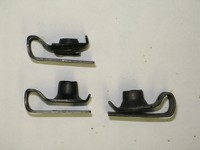I don't want to be accused of vendor-bashing, so I won't provide personal comment on the images below.. Only factual comments.
The low product quality of "stressed" sub-standard reproduction parts will kill one of us some day and in my view, they should be illegal.
These are "J-nuts" that are used to secure Camaro front leaf hangers to the body of the car. Common-sense would tell us that their strength is important to keeping the car on the road and ourselves alive!
On the left are 2 "OER" packaged, no-name J nuts. On the right is 1 "CIP" branded J nut.


UPC4-B1 of the 1969 Chevrolet Assy Manual suggests 20-30 ft/lbs of torque is required on each of the 6 bolts when fastening the spring hangers in place.
(I'm no engineer, but I know a bolt/nut is to be torqued to ~75% of it's maximum yield strength. This means that if a bolt were to go beyond it's maximum yield strength or "point of elasticity" (permanent deformation) at 40ft/lbs, it's maximum recommended torque capacity will be therefore rated at 30ft/lbs, or of course, 75% of it's maximum yield strength.)
Note the top left J nut. This has permanently deformed at approximately 20-25ft/lbs, in fact 5 out of the 6 OER packaged J-nuts did fail at that torque rating so it can be said that it wasn't just "a bad one". This also means that these particular J-nuts would have a torque rating of 15ft/lbs, or 1/2 of GM's recommended rating for this fastener's application.
The bottom left J-nut is unused.
Note that the "CIP" J-nut on the right has more material around the threaded area. The CIP J-nut is also much stronger if one were to try and pry it open even though design and material thicknesses are somewhat identical.
It comfortably torqued to 30ft/lbs and it's resistance at point indicated it would easily go 40ft/lbs.
Here are some better pics of the failed OER packaged, no-name J-nuts.



Please do not use the J-nuts that come in OER packaging. Apart from the huge inconvenience factor of having to swap them for the higher quality part after installation, they are likely to fail when torquing or worse, when your running 120+ mph at the drag strip.
Pardon me for going on about it, but it's something I feel strongly about and believe some substandard components flooding the resto market are really putting our lives at risk for the sake of literally saving a dollar or two.
www.amkproducts.com , part #B12012. $5 will buy you a packet of 2.
They have the "CIP" stamping and torque to spec no problems.
The low product quality of "stressed" sub-standard reproduction parts will kill one of us some day and in my view, they should be illegal.
These are "J-nuts" that are used to secure Camaro front leaf hangers to the body of the car. Common-sense would tell us that their strength is important to keeping the car on the road and ourselves alive!
On the left are 2 "OER" packaged, no-name J nuts. On the right is 1 "CIP" branded J nut.


UPC4-B1 of the 1969 Chevrolet Assy Manual suggests 20-30 ft/lbs of torque is required on each of the 6 bolts when fastening the spring hangers in place.
(I'm no engineer, but I know a bolt/nut is to be torqued to ~75% of it's maximum yield strength. This means that if a bolt were to go beyond it's maximum yield strength or "point of elasticity" (permanent deformation) at 40ft/lbs, it's maximum recommended torque capacity will be therefore rated at 30ft/lbs, or of course, 75% of it's maximum yield strength.)
Note the top left J nut. This has permanently deformed at approximately 20-25ft/lbs, in fact 5 out of the 6 OER packaged J-nuts did fail at that torque rating so it can be said that it wasn't just "a bad one". This also means that these particular J-nuts would have a torque rating of 15ft/lbs, or 1/2 of GM's recommended rating for this fastener's application.
The bottom left J-nut is unused.
Note that the "CIP" J-nut on the right has more material around the threaded area. The CIP J-nut is also much stronger if one were to try and pry it open even though design and material thicknesses are somewhat identical.
It comfortably torqued to 30ft/lbs and it's resistance at point indicated it would easily go 40ft/lbs.
Here are some better pics of the failed OER packaged, no-name J-nuts.



Please do not use the J-nuts that come in OER packaging. Apart from the huge inconvenience factor of having to swap them for the higher quality part after installation, they are likely to fail when torquing or worse, when your running 120+ mph at the drag strip.
Pardon me for going on about it, but it's something I feel strongly about and believe some substandard components flooding the resto market are really putting our lives at risk for the sake of literally saving a dollar or two.
www.amkproducts.com , part #B12012. $5 will buy you a packet of 2.
They have the "CIP" stamping and torque to spec no problems.





